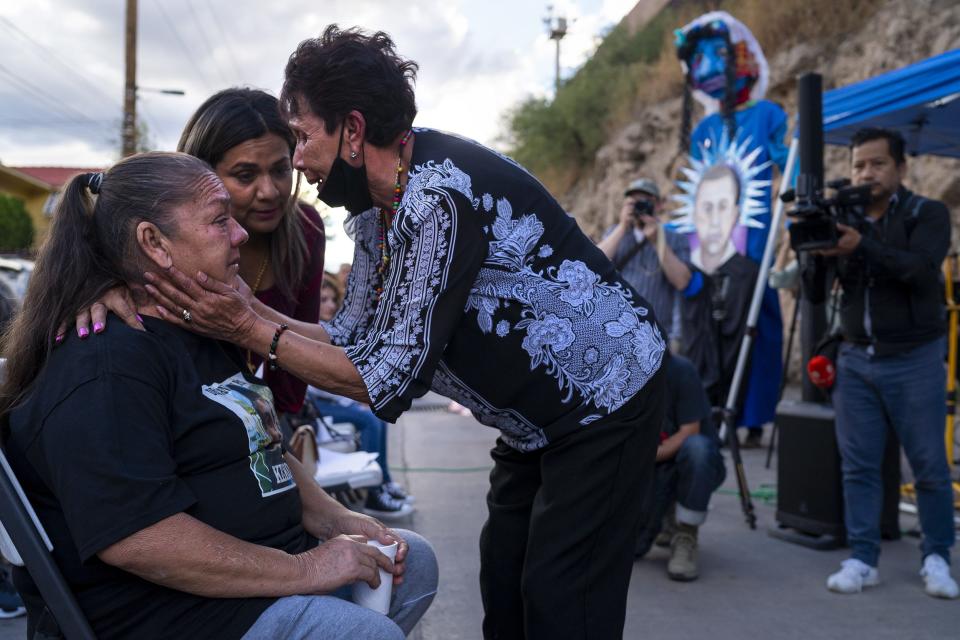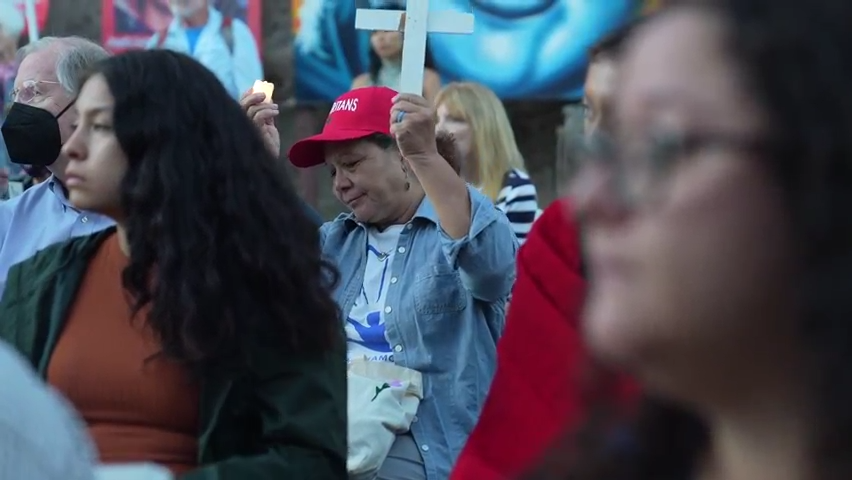Holding on to hope, families rally in Nogales to demand justice for cross-border slayings
NOGALES, Mexico — Bishop José Leopoldo González stood at a makeshift altar on Calle Internacional, just below the 22-foot border fence that stood mounted atop a 14-foot cliff. He led a binational Mass for nearly 100 people at the site where a U.S. Border Patrol agent had shot and killed a Mexican teenager 10 years ago in October 2012.
Moments earlier, Tucson Bishop Edward Weisenburger had addressed the teen's family in Spanish. As he spoke, the setting sun illuminated a mural painting of the teen, José Antonio Elena Rodríguez, fastened to the cliff behind him.
"The death of José Antonio undoubtedly moved us all, not just because of the painful loss of a life that was just beginning, full of goals and dreams," Weisenburger said. "But also because of the injustice, an injustice that continues 10 years later."
As González concluded the Mass at the border, Taide Elena, José Antonio's grandmother, stood from her seat, located a few feet from where her grandson collapsed to the ground and died. She walked to where Guadalupe Güereca was sitting.
Güereca had taken an eight-hour bus ride from Ciudad Juárez to Nogales to be there for the ceremony. Her 15-year-old son, Sergio Adrián Hernández Güereca, was also shot and killed by a Border Patrol agent in 2011, a year before José Antonio's death.
Elena took Güereca's face in her hands. With tears streaming down Elena's cheek, she told Güereca something quietly and then embraced her.

Araceli Rodríguez, José Antonio's mother, embraced them both as well.
They held the hug for a moment before letting go and returning to their seats.
The Mass on Oct. 9 was part of a two-day celebration in the border communities known collectively as Ambos Nogales. They marked the 10th anniversary of José Antonio's death on Oct. 10, 2012.
From Arizona, Agent Lonnie Swartz fired 16 shots in less than a minute through the border fence that overlooked the street in Sonora where the Mass took place. Ten of the bullets struck and killed the Mexican teen. Swartz claims he fired in self-defense to stop rocks being thrown at agents from across the border.
In the 10 years since the shooting, two jury trials in Tucson and a U.S. Supreme Court decision acquitted Swartz for his role in the shooting.
That outcome has left the family feeling like their quest for justice for José Antonio remains unfulfilled. But they're not alone in that feeling.
The two-day ceremony marking the Mexican teen's death also highlighted the deaths of five other individuals killed by Border Patrol agents in cross-border shootings throughout the U.S.-Mexico border. Relatives for two of them were in attendance in Nogales.
"I'm very glad, it gives me lots of strength," Rodríguez said. "I feel that we're united by the same pain. We're learned to live with that pain. So I'm very glad that they were able to join us."
New podcast: Listen to the full season of 'Rediscovering: Killed Through the Border Fence'
The person who may understand best about Rodríguez's loss is Güereca. Her son Sergio was 15 when he was killed in 2011, one year before José Antonio. Jesús Mesa Jr., a Border Patrol agent in El Paso, shot him across the Rio Grande.
His case was closely woven to José Antonio's. Güereca also sued Mesa in federal court for killing Sergio. That case did not go to criminal trial. But the civil lawsuit ended up twice before the Supreme Court.
In February 2020, the majority-conservative court ruled she didn't have the standing to sue Mesa because Sergio was a Mexican citizen in Mexican territory when he died, even though the agent fired from the U.S. The ruling ended a similar lawsuit that Rodríguez had filed.
Güereca remains distraught over Sergio's death. At times, she'll believe that he's out somewhere and will come back to her, she said, but then as the day goes on, it sinks in and that belief goes away.
The Supreme Court's decision only deepens her sadness.
"The hardest part for me is that no one takes what you're going through into account solely because he was Mexican, because he was killed in Mexico," she said. "What do they think? That us as Mexicans don't have lives, that we're not worthy of protection as well? We do need it, because officials did nothing in this case."
Attorneys for Rodríguez and Güereca argued that the Supreme Court ruling essentially legalized cross-border shootings by taking away the ability to hold border agents accountable.

Luis Parra, one of the attorneys for Rodríguez and a Nogales native, said the responsibility for action now falls on Congress to create a path to justice for families during these types of cross-border incidents to ensure they don't happen again.
"The Supreme Court ruled that it is up to the Congress of the United States of America to change the law so that officers who exceed their use of force should be held accountable, should strip them of their qualified immunity," Parra said.
'Point of the spear': Families look beyond U.S. courts to hold border agents accountable
In the meantime, there is newfound hope for the families, stemming from a hearing that the Inter-American Commission will hold on Nov. 4 to address the death of another Mexican citizen in the custody of U.S. border officials.
Attorneys for Maria Puga, the wife of Anastasio Hernández Rojas, filed a petition before the court, after running into roadblocks within the U.S. court system. U.S. border agents and officers beat Hernández Rojas in San Diego in May 2010 as he struggled during his arrest for attempting to reenter the country illegally.
Attorneys argue the investigation into his death was tainted and are asking the commission to look into the use-of-force policies by U.S. border officials and the lack of access to justice for victims of excessive force. They are also on the U.S. to reopen the case.
"It has been a long journey to get to this moment. It will be the first time that we can present our human rights claims against the United States, a government that has denied us justice for twelve years,” Puga said in a statement.
The case is significant because it would be the first time the commission looks into the role of U.S. border agents in these types of killings. It could open the way for additional hearings, since Güereca and Araceli have also filed petitions before the commission.
In addition to Güereca, Nora Lam Gallegos also traveled to Nogales from Nuevo Laredo, Mexico. She's the wife of Guillermo Arevalo Pedroza.
The couple was having a birthday picnic for Guillermo with their two daughters along the banks of the Rio Grande in Nuevo Laredo in September 2012. Border Patrol agents on a patrol boat fired shots into Mexico because they said they had rocks thrown at them.
Some of the bullets struck and killed Guillermo, who died in one of his daughter's arms. To date, the family said there hasn't been anything resembling justice for his death, despite the trauma inflicted on their daughters.
"They saw everything and well, yes, they were in shock to see the situation that we went though," Lam Gallegos said. "We were stunned by all of this."
All three women — Lam Gallegos, Güereca and Rodríguez — have also cast blame on the Mexican government, which they accuse of not doing enough to help them.
Rodríguez said she and Elena are finalizing plans to visit Mexico City to urge the federal government to get more involved in the case.
Güereca said their end goal is not money, but rather the chance to seek justice for the deaths of their loved ones, as well as greater peace of mind so they can move on.
"I can't bring back my son with money, or even with justice, right? But at least it would make me feel better knowing that (the agent) would pay for what he did," Güereca said. "It can't stay like this because right now he's working calmly and has his children and family. I don't have my son."
Have any news tips or story ideas about immigration in the Southwest? Reach the reporter at rafael.carranza@arizonarepublic.com, or follow him on Twitter at @RafaelCarranza.
Support local journalism. Subscribe to azcentral.com today.
This article originally appeared on Arizona Republic: Families rally for justice in cross-border slayings in Nogales

